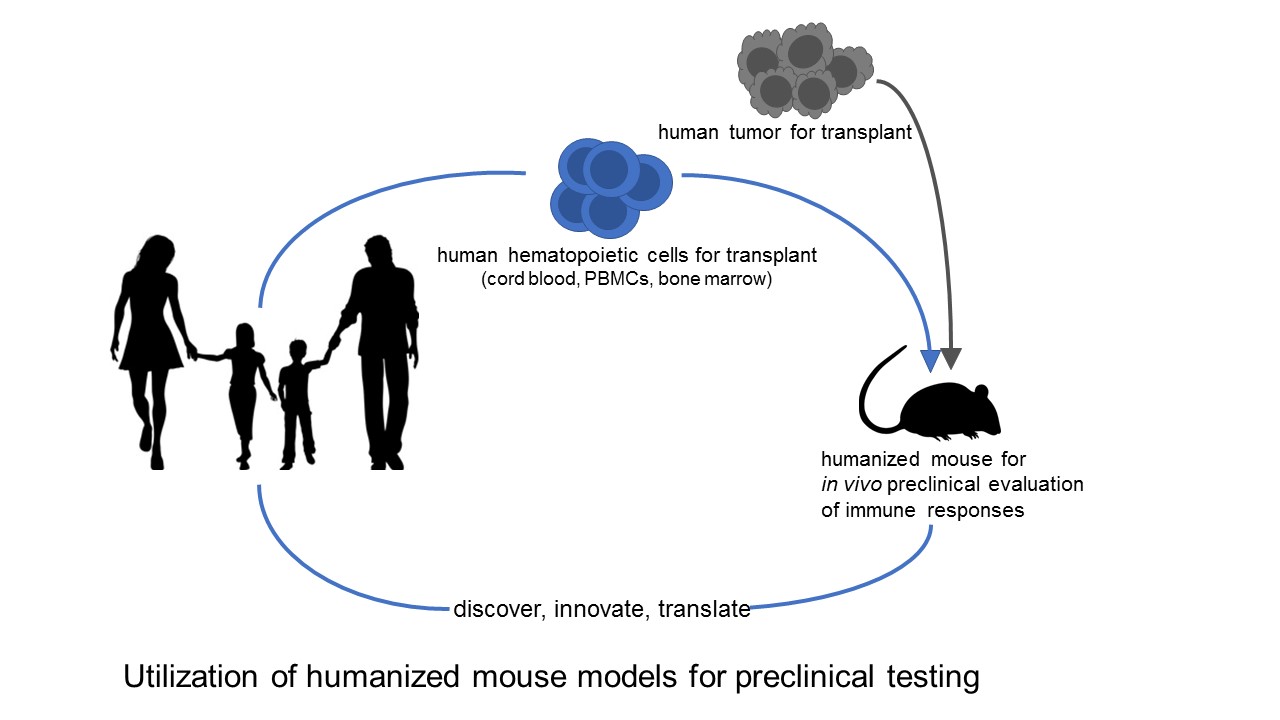
The purpose of the Pre-clinical Human Immune System Mouse models (PHISM) is to provide a nexus for multiple aspects of translational immunology research. The PHISM enables and promotes collaboration among investigators along the continuum of basic-translational-clinical research by establishing mechanisms that facilitate availability of human tissue for research and by generating and maintaining preclinical mouse models for the development and testing of candidate therapeutics. To succeed in the development of novel therapies, investigators need to access primary human cells and tissues that are healthy or affected by inflammation, cancer and autoimmunity, which is challenging for non-clinicians. Tissue studies from healthy control, preclinical and clinical subjects are required to fully understand the immunological impact of various therapeutic interventions, and ultimately bridge the gap to clinical care delivery. The PHISM will establish a network of clinicians, clinician/scientists and basic investigators to facilitate collaborative studies on primary human tissue of immunological relevance. Novel immunotherapies must be tested with sophisticated preclinical models before they can be tried in humans. Ideally, these models should provide a platform where the human immune system can be exposed to experimental and therapeutic manipulations and the readout is meaningful and applicable to humans.
The PHISM will provide this key component with the production, distribution and/or analysis of Human Immune System mice. Human Immune System mice are immunodeficient mice transplanted with a human immune system, or some of its components. When Human Immune System mice are engrafted with tumors, they become an ideal tool for testing the effects of novel immunotherapies—such as immune checkpoint inhibitors—on human immune responses.
While more often used in the immune-oncology arena, Human Immune System mice can also be utilized to understand basic mechanisms of the human immune system and to study genetic, biological, and pharmacological therapies to autoimmune and inflammatory responses. The laboratory directed by Dr. Roberta Pelanda has spent the last 10 years developing and improving Human Immune System mice for the study of B cells in the context of autoimmunity. In the last 2 years, the laboratory has also been involved in using Human Immune System mice to study the effects of drugs on the immune response to tumors.
Additional Human Immune System mouse models are under development that will expand current capabilities. Examples are the production of Human Immune System mice with either bone marrow (CD34-BM-BRGS hu-mice) or mobilized peripheral blood for the purpose of immune-oncology studies with matching immune system and tumor, or with the transplantation of fetal liver cells and thymus (CD34-FLT-BRGS Human Immune System mice) for the purpose of infection, vaccine or tumor studies. The PHISM facility is part of the Human Immunology and Immunotheapy Initiative (HI3), which is part of the Dean's Initative for Innovative awarded to the Department of Immunology and Microbiology in 2016.
|
Roberta Pelanda, PhD |
Julie Lang, PhD
|
| Hours | Location |
|
Monday - Friday 8:00am - 5:00pm |
Anschutz Medical Campus, |
| Name | Role | Phone | Location | |
|---|---|---|---|---|
| Julie Lang |
Co-Director, Humanized Mouse Core
|
303-724-8705
|
JULIE.LANG@CUANSCHUTZ.EDU
|
RC1-North, 8401-G
|
| Roberta Pelanda |
Director
|
303-724-8666
|
ROBERTA.PELANDA@CUANSCHUTZ.EDU
|
RC1-North, 8104
|